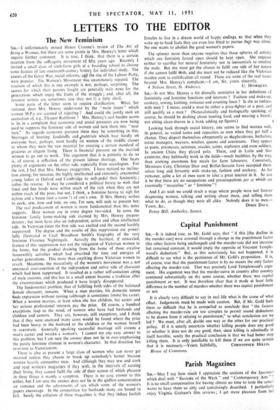SIR, - IS not Mrs. Henrey a bit dismally restrictive in her
definitions of femininity and feminine functions and interests ? Fashion and make-up, cookery, sewing, knitting, romance and counting linen ? Is she as ruthless with men ? I mean, could a man be either a prize-fighter or a poet, and still qualify as a man ? (Naturalistically and biologically speaking, of course, he should be dashing about hunting food, and wearing a beard ; not sitting clean-shaven in a bank adding up figures.)
Looking back through social history, one seems to find women with, in general, as varied tastes and capacities as men when they get half a chance. They disport themselves cdmpetently as shepherdesses, herbalists, estate managers, weavers, witches, queens and courtesans. They appear as poets, priestesses, actresses, oracles, saints, explorers and even soldiers. In ancient China they played polo. There, and in Latin and Slav countries, they habitually work in the fields—much healthier, by the way, than cooking enormous hot meals for farm labourers. Conversely, Messieurs Coty, Christian Dior and Brillat-Savarin have occupied them- selves long and fervently with make-up, fashion and cookery. As for yomance, quite a lot of men seem to take a great interest in it. So can it be that there are no occupations and preoccupations per se which are essentially "masculine" or " feminine"?
And I do with we could reach a stage where people were not forever diagnosing women, talking and writing about them, and telling them what to do, as though they were all alike. Nobody does it to men.—


































 Previous page
Previous page